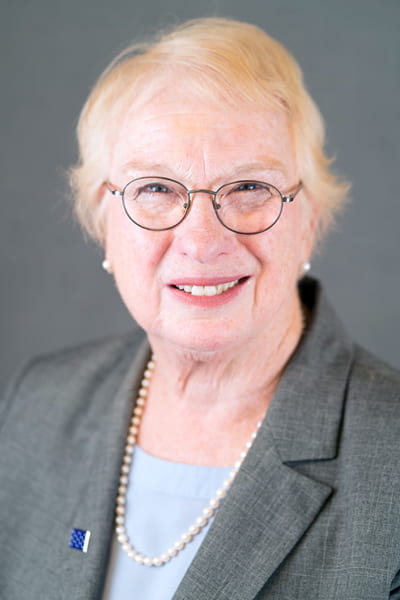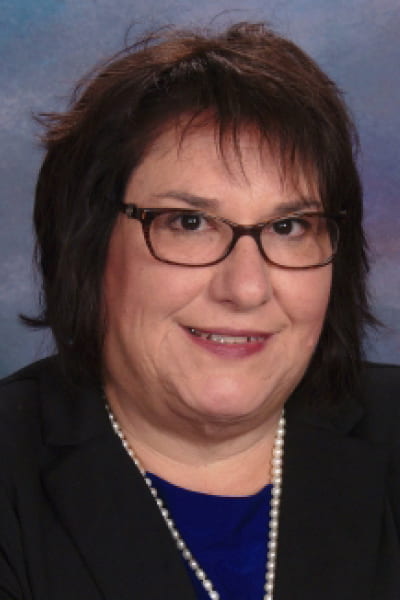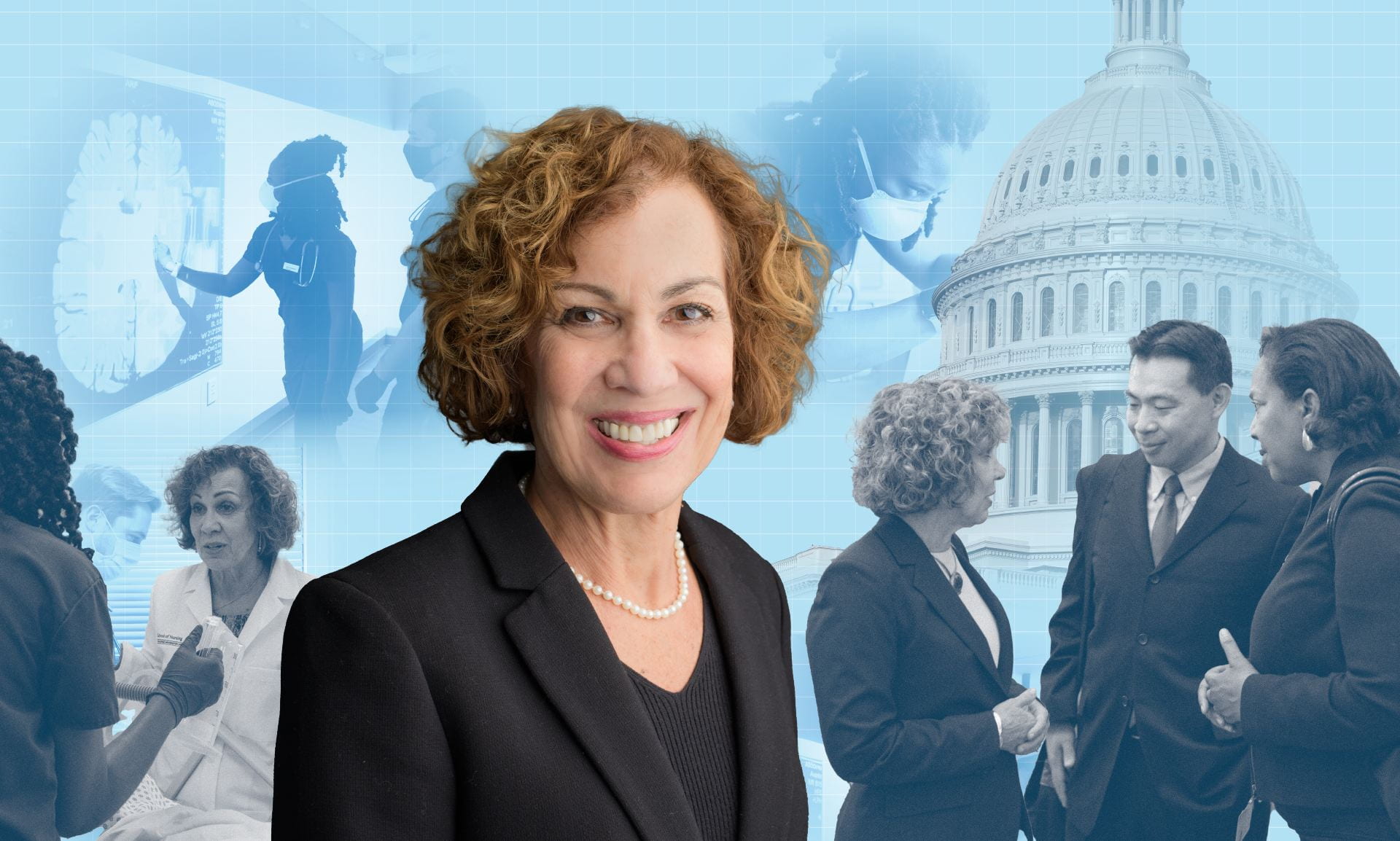The George Washington University School of Nursing’s graduate programs develop nurses who provide excellent care. They also train nurses to lead.
In U.S. News & World Report’s 2021 rankings of the “Best Online Master’s in Nursing Administration Programs,” GW Nursing was designated among the best, ranking No. 2 in Best Online Master’s in Nursing for Veterans, and No. 3 in Best Online Master’s in Nursing Administration & Leadership Programs.
GW Nursing’s emphasis on leadership development and public policy knowledge makes its graduate programs stand out. The faculty prepares students to serve as leaders at every level of nursing; to develop sound health policy; and to use their voices to advocate for patients, families, and communities.
Learn about four GW Nursing faculty members leading the way as practitioners, advocates, researchers, and educators.
Take On New Challenges
“I love the field of nursing. I’m really passionate about it,” said GW Nursing Professor Joyce Pulcini, Ph.D., RN, PNP-BC, FAAN. “It has offered me so many avenues to grow and to become a leader.”
As a nurse practitioner, author, educator, and organizational leader, Dr. Pulcini has always welcomed opportunities to lead. “I think the key to leadership is taking on a challenge when it comes to you,” she said. “You never know when that’s going to be.”
She has led initiatives and programs to train nurses and nurse practitioners in the U.S. and globally. In 2021, she was honored by the National Organization of Nurse Practitioner Faculties (NONPF) with the Lifetime Achievement Award, given to recipients “whose contributions have been visionary and stalwart in successfully developing and promoting the role of the nurse practitioner.”

“I love the field of nursing. I’m really passionate about it. It has offered me so many avenues to grow and to become a leader.”
– Dr. Pulcini
She has led initiatives and programs to train nurses and nurse practitioners in the U.S. and globally. In 2021, she was honored by the National Organization of Nurse Practitioner Faculties (NONPF) with the Lifetime Achievement Award, given to recipients “whose contributions have been visionary and stalwart in successfully developing and promoting the role of the nurse practitioner.”
For Dr. Pulcini, who has served as NONPF president, the award is personally and professionally rewarding. “[The NONPF] is near and dear to my heart,” she said. “I’m very honored they would give me the Lifetime Achievement Award.”
Dr. Pulcini has been a leader in health care and nursing policy at the local, state, and national levels. She shares her knowledge, research, and experience through courses such as Health Policy, Quality, and Political Process, where students analyze the three main components of health policy: cost, quality, and access.
At GW Nursing, students gain the clinical training, leadership skills, and policy knowledge needed to lead, Dr. Pulcini said.
“In addition to the clinical content, we try to move students to the next level with the Nursing Leadership course and with policy courses,” said Dr. Pulcini. “GW prepares graduates to be leaders in the field.”
Create Positive Change
“Nurses have the ability to serve as change agents in creating systems that bridge health care and social care,” Ashley Darcy-Mahoney, Ph.D., NNP, FAAN said.
Dr. Darcy-Mahoney is the interim director of infant research at GW’s Autism & Neurodevelopmental Disorders Institute, associate professor, and a neonatal nurse practitioner and researcher.
Last year, she served as the National Academy of Medicine (NAM) Distinguished Nurse Scholar-in-Residence (2020-2021). “The goal of the program is to encourage nurse leaders to play a more prominent role in health policy, and to make nursing part of the public conversation when we think about health and policy,” Dr. Darcy-Mahoney said.

“Not only can we create wonderful, incredible, smart, dedicated clinicians as part of our School of Nursing, but we can also create powerful advocates for change at the local, state, and federal levels.”
– Dr. Darcy-Mahoney
As scholar-in-residence, she contributed to NAM’s Future of Nursing Report: 2020-2030, which focuses on topics such as reducing barriers to health care access, increasing equity, instituting pay reform, and diversifying the nursing workforce.
GW’s Autism & Neurodevelopmental Disorders Institute conducts research to improve understanding of the root causes of autism spectrum disorder and to enhance diagnosis and treatment options. As the institute’s leader, Dr. Darcy-Mahoney ensures the team has the necessary environment and resources to conduct innovative research.
This semester, Dr. Darcy-Mahoney teaches the graduate-level Genetics course; and in the spring, she will lead a public health nursing course for graduate students, and a course on pediatric adversity for undergraduate students.
Dr. Darcy-Mahoney believes GW Nursing prepares graduates to bring about positive change. “Not only can we create wonderful, incredible, smart, dedicated clinicians as part of our School of Nursing, but we can also create powerful advocates for change at the local, state, and federal levels,” Dr. Darcy-Mahoney said.
Advance Health Care Quality
GW Nursing instructor Esther Emard, M.S.N., MSLIR, RN, CPHQ, has a passion for providing high-quality care that started early in her career.
“I was a critical care nurse specialist, involved in providing high-quality care and safe care to patients in extremely vulnerable conditions,” Ms. Emard said. “As I advanced through the levels of nursing leadership, which I was very fortunate to do, it became even clearer to me how important it was to make sure that as nurses we continue to advance our knowledge, skill, and competencies to deliver high-quality care that is safe.”
Ms. Emard was recently elected to the board of the National Association for Healthcare Quality (NAHQ), which is the only organization dedicated to health care quality professionals. The NAHQ offers the only nationally recognized certification in health care quality, the Certified Professional in Healthcare Quality®.

“Nurses are at the front line, providing health and health care across the life span. We need to be at the table in policy discussions.”
– Esther Emard
GW Nursing aims to prepare students to achieve this credential with a new graduate-level course developed with the NAHQ. Ms. Emard helped to design the Advancing Health Care Quality and Patient Safety course, which will be offered through the Nursing Leadership and Management master’s degree program next academic year.
Additionally, Ms. Emard serves as faculty for the Health Care Quality Process; Health Policy, Quality and Political Process; and Health Care Quality Improvement courses, as well as for the Patient Safety Systems course for GW’s School of Health Science, where she also has an adjunct appointment.
“Nursing is one of the largest professions in health care, and nurses are at the front line, providing health and health care across the life span,” Ms. Emard said. “We need to be at the table in policy discussions. We bring the competency, the knowledge, skill, and the expertise to those discussions, along with our health care colleagues, on advancing health care quality and patient safety.”
Advocate for Underserved Populations
“Being a nurse leader doesn’t always mean that you’re the manager or the CEO. There is leadership at all levels,” Joyce Knestrick, Ph.D., FNP-BC, FAANP, FAAN said. “For me, it’s always an adventure to see what I can do to make improvements and to see what I can change to make things better.”
Dr. Knestrick is director of nurse leadership management, director of executive leadership, and an associate professor. This semester, she teaches the graduate course Health Care Enterprise.
As a family nurse practitioner, Dr. Knestrick practices in rural Appalachia, caring for low-income and underserved populations, and she advocates for legislation that removes barriers to access to high-quality, affordable health care.

“We have a faculty of outstanding leaders who understand what it takes to be a leader in today’s changing times..”
– Dr. Knestrick
For her career of dedicated service, Dr. Knestrick was awarded the American Association of Nurse Practitioners’ (AANP’s) 2021 Towers Pinnacle Award, which honors recipients who exemplify advocacy, passion, and dedication to the advancement of the nurse practitioner role through policy, practice, and education.
“Dr. Knestrick’s advocacy and scholarship research led to the development of community health centers in Appalachia that have become a national model for quality health services for underserved rural areas,” AANP’s website states.
For Dr. Knestrick, being a leader means being willing to step in to solve difficult problems. “I, always in my career, have been a person who is looking for a solution. I think that I’ve always tried to look for how we can fix or solve a puzzle or problem,” said Dr. Knestrick.
As the global community continues to face the ongoing pandemic, nurses play a critical role in creating solutions, providing safe and high-quality care, and advocating for the patients and communities they serve. At GW Nursing, the award-winning faculty offers advice, support, and knowledge to prepare graduates to meet these challenges.
“We really mentor our students to do well,” Dr. Knestrick said. “We have a faculty of outstanding leaders who understand what it takes to be a leader in today’s changing times.”
AUTHOR Meredith Lidard Kleeman

